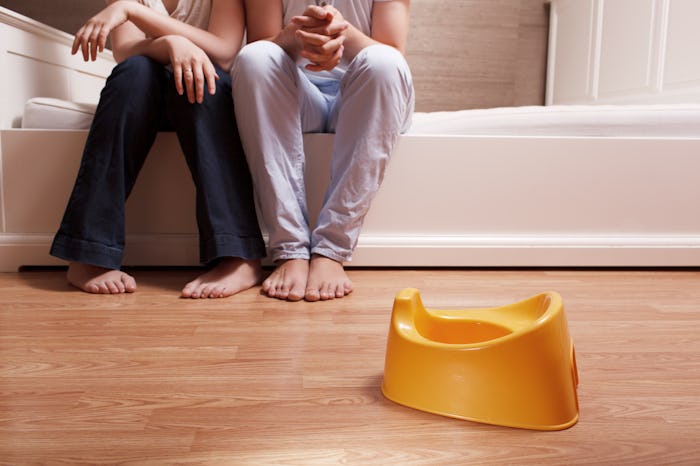Life

7 Crappy Myths About Nighttime Potty Training
Just when you thought being a parent couldn't get more exciting — aka unpredictable and frustrating — your little one hits the milestone where they're ready to abandon their diaper. But just because they've shown an interest in toilets doesn't necessarily mean it's going to be a smooth transition. Ask any parent, and I guarantee they'll have at least one horror story about bed-wetting or rogue bowel movements. But don't let the stories get to you, because there are plenty of myths about nighttime potty training that just aren't true. Sure, making the move from diapers to big kid underwear can be daunting, but it's not as scary as some people make it out to be.
When my partner and I first began potty training our son, it was something straight out of a Monty Python skit — complete with prat falls and silly walks. It was a bit of a learning curve, for sure. Bedtime also became a bit of an ordeal, since we had to assist him sometimes in the middle of the night. When I vented to my fellow parents, they all chimed in with wildly varying timelines, expectations, and rules. So how do you know what's fact or fiction? Check out these myths about nighttime potty training to put your mind at ease.
Myth #1: Bed-Wetting Is A Sign Of Laziness
You wouldn't believe some of the things I've heard parents say to each other while I'm in line to pick my son up from school. Some think that if their child wets the bed at night, it's because they just don't want to get up. As pediatrician Dr. Ari Brown told Parents, "your child isn't lazy because he isn't dry at night yet." What's the truth behind this then? Your child probably, "has a small bladder, cannot hold it all night long yet, and is not aware enough to body urges to wake up," Brown explained. So before you jump to conclusions, remember that a child's body and mind is still developing.
Myth #2: Boys Take Longer Than Girls
Though I know plenty of girls who aced nighttime potty training earlier than my son, there are just as many girls who are still learning. As psychologist Dr. Heather Wittenberg told Baby Center, it's a myth that girls complete potty training faster than boys. As with most developmental things, each child learns at their own pace.
Myth #3: Rewards Prevent Nighttime Accidents
Just because special treats are meant to encourage certain behaviors, it doesn't necessarily mean they will discourage other actions. According to Jamie Glowacki, a parenting expert and author, using rewards for potty training doesn't guarantee a dry night. Though a reward system might work for some, it can create a cycle that's particularly hard to break at night.
Myth #4: Day And Night Training Happen Together
There seems to be a myth floating around that if your child has successfully used the potty during the day, then it shouldn't be any different come nighttime. However, as pediatrician Dr. Nathan Blum told Care, "most children are daytime toilet trained long before they remain dry at night." So don't be discouraged if nighttime training is taking longer than it did during the day.
Myth #5: There's A Magic Number
As the other kids in my son's class graduated from diapers to big kid underwear, I was concerned if my child should be hitting his toilet goals by a certain age. When I voiced these worries to my son's pediatrician, she said that there's no such thing as a magic number for when kid's will be able to stay dry overnight. Every child is different and progresses at their own pace.
Myth #6: Punishment Works
Similar to the trap of giving rewards for certain behaviors, it's simply untrue that punishing your child for nighttime potty mishaps will speed up the process. Pediatrician and author Dr. Harvey Karptold Parents that, "punishing a child for wetting the bed will just damage his self-esteem and make him feel like he's disappointed you." Obviously it can be frustrating to change sheets in the middle of the night, but shaming them for it doesn't help anyone.
Myth #7: It Can Happen Overnight
Though there may be kids out there who have mastered nighttime potty training relatively quickly, that's far from the norm. As Wittenberg told Baby Center, it takes eight months to potty train a child, but many children take even longer. Again, there's no universal timetable for potty training. As my mom once told me, by the time your kid is in college, no one will remember who walked, spoke, or peed on the potty first.